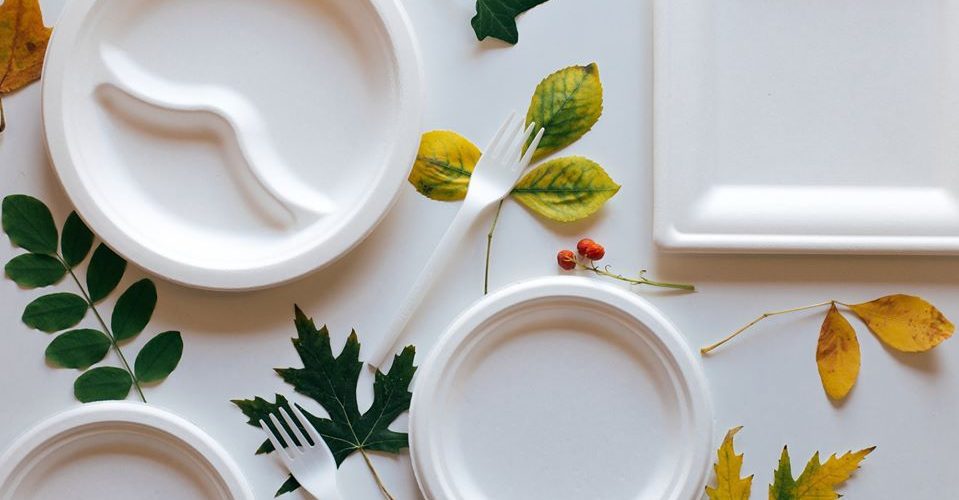For more than a year, the company "Ecoprime Recycle" SRL has been promoting sustainable alternatives to single-use plastic packaging. They have placed themselves on the market in the Republic of Moldova with quality products based on plants, i.e. rapidly renewable resources, such as corn starch or sugar cane.
After they are used, products offered by Ecoprime Recycle can be composted, some at home and others in industrial composting centers. Since they fall into the category of organic waste, they are the only packaging that can be composted together with food waste. It requires less energy in the production process and the carbon footprint is 75% lower than in the case of classic plastic packaging.
The good thing is that many beautiful things are already happening. There are many companies, cafes, restaurants, schools that are making efforts to reduce waste and the amount of single-use plastic.
What is the advantage of compostable packaging?
They can be thrown away with food waste, and recovered at the same time in composting centers. There is no need to wash them before they are thrown into the compost pit. Industrial composting is currently limited in the Republic of Moldova, but technology has allowed us to bring to the market packaging that can be composted at home, along with vegetable waste.
For example, there is an effective method of composting at home, namely "Bokashi". It is a composting system that originated in Japan and is ideal for home use. Unlike traditional composting, it relies on the addition of effective microorganisms (EM) which are a mixture of bacteria and yeasts that break down food using a fermentation process. It is also significant that the "Bokashi" process is anaerobic, as virtually any air is excluded, whereas normal composting requires a large amount of mixed air.
It is a perfect method for those who have houses on the ground with a garden. Of course, it is possible to feed your plants with commercially produced compost and fertilizers, but home composting is so easy, cheap and effective that it makes sense to recycle as much as possible into the soil.
What is the role of compostable household bags?
Compostable household bags were designed as a solution for collecting organic waste for composting. Unlike paper bags, they better resist the moisture generated by food scraps, which makes them more practical to use. Compostable bags and paper are the only types of products that can be composted and collected with food waste.
Bags and utility bags are made from corn starch granules, manufactured by Novamont. They are the best quality granules currently on the market. Cornstarch is mixed with bio-polymers and they use a lot of research to achieve a recipe that meets both environmental and quality requirements. The granules do NOT contain plastic and do not contain BPA (bisphenol A). This recipe is continuously developed and is appreciated by specialists as representing the pinnacle of research in this field.
What are the criteria a product must meet to receive compostability certification?
In order for a product to receive certification, it needs to be subjected to tests that will validate its final form. According to European standards, a compostable material must have the following characteristics:
Composition: the norm stipulates a maximum percentage of volatile solids, heavy metals (Cu, Zn, Ni, Cd, Pb, Hg, Cr, Mo, Se, As) and fluorine acceptable in packaging materials, which must not be exceeded.
Biodegradability: the acceptable limit of biodegradation must be at least 90% from the product within a maximum of 6 months.
Disintegration: the property of the product to disintegrate in compost. After 12 weeks, at least 90% (in quantity) in the package must be able to pass through a 2mm sieve.
Final compost quality and eco-toxicity: the quality of the final compost cannot be modified by the packaging materials added to the compost and cannot be harmful to the environment. The norm requires carrying out eco-toxicity tests based on a germination test and obtaining a higher result of 90% than that of the corresponding reference compost.

How do we check if a product is actually compostable??
The only way we can be sure of this is to check the product's certification. Worldwide there are several reference standards and the reference for Europe is the standard EN13432.
All Ecoprime Recycle products are tested and reported to a standard by accredited bodies. The most prestigious organizations recognized at EU level and issuing these certifications are TUV Austria and Din Certco. We hold these certificates and are proud of this fact.
Starting from January 1, 2020, according to" Law no. 231 of 23.09.2010 regarding internal trade
Article 20/1. Retail restrictions' will ban plastic bags with a wall thickness of less than 50 microns, which would mean all shops would be required to offer shoppers only biodegradable and compostable bags.
It is very important that all economic agents ensure that they procure bags that do not contain plastic at all, therefore they ask the supplier for all the quality certificates mentioned above.
More details about Ecoprime Recycle you can find them on:
www.facebook.com/ecoprimerecycle/
Instagram: @ecoprimerecycle

